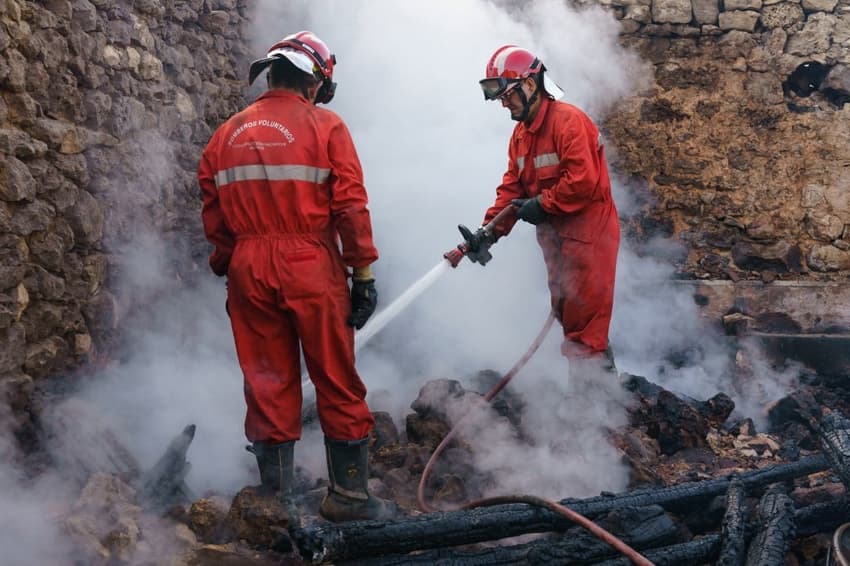Europe facing record year for wildfire destruction: EU

Europe's blistering summer may not be over yet, but 2022 is already breaking records, with nearly 660,000 hectares ravaged since January, according to the EU's satellite monitoring service.
And while countries on the Mediterranean have normally been the main seats of fires in Europe, this year, other countries are also suffering heavily.
Fires this year have forced people to flee their homes, destroyed buildings and burned forests in EU countries, including Austria, Croatia, France, Greece, Italy, Portugal and Spain.
Some 659,541 hectares (1.6 million acres) have been destroyed so far, data from the European Forest Fire Information System (EFFIS) showed, setting a record at this point in the year since data collection began in 2006.
Europe has suffered a series of heatwaves, forest fires and historic drought that experts say are being driven by human-induced climate change.
They warn more frequent and longer heatwaves are on the way.
The worst-affected country has been Spain, where fire has destroyed 244,924 hectares, according to EFFIS data.
The EFFIS uses satellite data from the EU's Copernicus Atmosphere Monitoring Service (CAMS).
READ ALSO: EXPLAINED: How the climate crisis is hitting Europe hard
The data comes after CAMS said Friday that 2022 was a record year for wildfire activity in southwestern Europe and warned that a large proportion of western Europe was now in "extreme fire danger".
"2022 is already a record year, just below 2017," EFFIS coordinator Jesus San-Miguel said. In 2017, 420,913 hectares had burned by August 13, rising to 988,087 hectares by the end of the year.
"The situation in terms of drought and extremely high temperatures has affected all of Europe this year and the overall situation in the region is worrying, while we are still in the middle of the fire season," he said.
Since 2010, there had been a trend towards more fires in central and northern Europe, with fires in countries that "normally do not experience fires in their territory", he added.
"The overall fire season in the EU is really driven mainly by countries in the Mediterranean region, except in years like this one, in which fires also happen in central and northern regions," he added.
READ MORE:
- Hundreds evacuated as Spain battles wildfires in northwest
- What to do and what to avoid if you witness a forest fire in Spain
- Volunteer firefighters key in France's fight against wildfires
- German firefighters in 'intense battle' with wildfire
Comments
See Also
And while countries on the Mediterranean have normally been the main seats of fires in Europe, this year, other countries are also suffering heavily.
Fires this year have forced people to flee their homes, destroyed buildings and burned forests in EU countries, including Austria, Croatia, France, Greece, Italy, Portugal and Spain.
Some 659,541 hectares (1.6 million acres) have been destroyed so far, data from the European Forest Fire Information System (EFFIS) showed, setting a record at this point in the year since data collection began in 2006.
Europe has suffered a series of heatwaves, forest fires and historic drought that experts say are being driven by human-induced climate change.
They warn more frequent and longer heatwaves are on the way.
The worst-affected country has been Spain, where fire has destroyed 244,924 hectares, according to EFFIS data.
The EFFIS uses satellite data from the EU's Copernicus Atmosphere Monitoring Service (CAMS).
READ ALSO: EXPLAINED: How the climate crisis is hitting Europe hard
The data comes after CAMS said Friday that 2022 was a record year for wildfire activity in southwestern Europe and warned that a large proportion of western Europe was now in "extreme fire danger".
"2022 is already a record year, just below 2017," EFFIS coordinator Jesus San-Miguel said. In 2017, 420,913 hectares had burned by August 13, rising to 988,087 hectares by the end of the year.
"The situation in terms of drought and extremely high temperatures has affected all of Europe this year and the overall situation in the region is worrying, while we are still in the middle of the fire season," he said.
Since 2010, there had been a trend towards more fires in central and northern Europe, with fires in countries that "normally do not experience fires in their territory", he added.
"The overall fire season in the EU is really driven mainly by countries in the Mediterranean region, except in years like this one, in which fires also happen in central and northern regions," he added.
READ MORE:
- Hundreds evacuated as Spain battles wildfires in northwest
- What to do and what to avoid if you witness a forest fire in Spain
- Volunteer firefighters key in France's fight against wildfires
- German firefighters in 'intense battle' with wildfire
Join the conversation in our comments section below. Share your own views and experience and if you have a question or suggestion for our journalists then email us at [email protected].
Please keep comments civil, constructive and on topic – and make sure to read our terms of use before getting involved.
Please log in here to leave a comment.